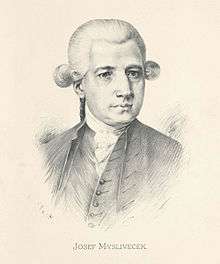Demetrio (1779)
| Josef Mysliveček |
|---|
 |
|
Operas
|
Demetrio is an eighteenth-century Italian opera in 3 acts by the Czech composer Josef Mysliveček. It was the composer's second setting of a libretto by the Italian poet Metastasio that was first performed in 1731, one of the most popular of the Metastasian librettos in Mysliveček's day. For a performance in the 1770s, it would only be expected that a libretto of such age would be abbreviated and altered to suit contemporary operatic taste. The cuts and changes in the text made for the 1779 performance of Mysliveček's opera are not attributable. All of Mysliveček's operas are of the serious type in Italian language referred to as opera seria.
Performance history
The opera was first performed at the Teatro San Carlo in Naples on 13 August 1779 in honor of the birthday of the queen of Naples, Maria Carolina.[1] It was the last of the nine operas composed by Mysliveček for the Teatro San Carlo between the years 1767-79, more than by any other composer during the same period. It was only a modest success, however, and its run was interrupted by an eruption of the volcano Mt. Vesuvius. The cast was not particularly distinguished for a production at the San Carlo, but it did include the castrato Domenico Bedini, who would later appear in Wolfgang Amadeus Mozart's opera La clemenza di Tito in Prague in 1791.
Roles
| Role | Voice type | Premiere cast, 13 August 1779, Teatro San Carlo, Naples |
|---|---|---|
| Cleonice, queen of Syria, in love with Alceste | soprano | Rosa Agostini |
| Alceste, later revealed to be Demetrio, king of Syria | soprano castrato | Domenico Bedini |
| Fenicio, grandee of the realm, tutor of Alceste, and father of Olinto | tenor | Gaetano Scovelli |
| Olinto, grandee of the realm and rival of Alceste | soprano castrato | Gaspare de Filippis |
| Barsene, confidante of Cleonice and secretly in love with Alceste | soprano | Caterina Lusini |
| Mitrane, captain of the guards and friend of Fenicio | soprano | Antonia Rubinacci (in a breeches role) |
Vocal Set Pieces
Act I, scene 1 - Aria of Cleonice, "Fra tanti pensieri"
Act I, scene 2 - Aria of Fenicio, "Se fecondo, e vigoroso"
Act I, scene 3 - Aria of Alceste, "Scherza il nocchier talora"
Act I, scene 4 - Aria of Olinto, "Che mi giova l'onor della cuna"
Act I, scene 5 - Aria of Barsene, "Dal labbro che t'accende"
Act I, scene 7 - Duet for Cleonice and Alceste, "Ah, se di te mi privi"
Act II, scene 1 - Aria of Olinto, "È la fede degli amanti"
Act II, scene 2 - Aria of Mitrane, "Dice che t'è fedele"
Act II, scene 3 - Aria of Cleonice, "Nacqui gli affanni in seno"
Act II, scene 6 - Aria of Fenicio, "Alme incaute che torbide ancora"
Act II, scene 7 - Aria of Barsene, "So che per gioco"
Act II, scene 8 - Aria of Olinto, "Non fidi al mar che freme"
Act II, scene 10 - Aria of Alceste, "Non so frenare il pianto"
Act II, scene 12 - Aria of Cleonice, "Mi parea del porto in seno"
Act III, scene 1 - Aria of Cleonice, "Nacqui gli affanni in seno"
Act III, scene 2 - Aria of Alceste, "Quel labbro adorato"
Act III, scene 3 - Aria of Fenicio, "Giusti Dei da voi non chiede"
Act III, scene 4 - Aria of Barsene, "Semplicetta tortorella"
External links
Complete score in manuscript available for viewing and downloading at http://www.internetculturale.it (Subcategory: Digital Contents)
See also
References
- ↑ Detailed documentation concerning the Naples performance of Mysliveček's Demetrio of 1779 is found in Daniel E. Freeman, Josef Mysliveček, "Il Boemo" (Sterling Heights, Mich.: Harmonie Park Press, 2009).